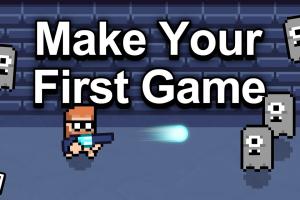Step-by-Step Guide: How to Make a Game from Scratch

-
Quick Links:
- 1. Understanding Game Development
- 2. Game Concept and Planning
- 3. Choosing the Right Tools
- 4. Designing Game Mechanics
- 5. Creating Game Art
- 6. Programming Your Game
- 7. Testing Your Game
- 8. Publishing Your Game
- 9. Marketing Your Game
- 10. FAQs
1. Understanding Game Development
Game development is a multifaceted process that involves the creation of video games for various platforms. It combines multiple disciplines, including design, programming, art, and sound, to create an engaging experience for players.
According to a report by Statista, the global video game market is projected to reach $200 billion by 2023, making this a lucrative field for aspiring developers.
2. Game Concept and Planning
The first step in making a game is to come up with a concept. Start by brainstorming ideas and writing them down. Consider the following:
- Game genre (e.g., action, puzzle, RPG)
- Target audience
- Unique selling points (USPs)
Once you have your concept, create a game design document (GDD) that outlines:
- Gameplay mechanics
- Storyline and characters
- Art style and sound design
3. Choosing the Right Tools
Selecting the right tools is crucial for game development. Here are some popular options:
- Game Engines: Unity, Unreal Engine, Godot
- Graphics Software: Adobe Photoshop, Blender, GIMP
- Sound Tools: Audacity, FL Studio
4. Designing Game Mechanics
Game mechanics are the rules and systems that govern gameplay. Consider the following elements:
- Player controls
- Scoring system
- Level design
For example, in a platformer game, the player might jump, run, and collect items to progress through levels.
5. Creating Game Art
Visual elements are crucial for engaging players. Here’s how to create appealing game art:
- Develop a cohesive art style
- Create character sprites and backgrounds
- Utilize tools like Adobe Illustrator or Inkscape for vector art
6. Programming Your Game
Programming is at the core of game development. Choose a programming language that fits your chosen game engine:
- C# for Unity
- C++ for Unreal Engine
- GDScript for Godot
Start with simple scripts to implement basic mechanics, then progressively add complexity.
7. Testing Your Game
Testing is essential to ensure a smooth user experience. Implement the following types of testing:
- Alpha Testing: Internal testing by the development team.
- Beta Testing: External testing by a selected group of players.
Gather feedback and make necessary adjustments to improve gameplay.
8. Publishing Your Game
Once your game is polished, it’s time to publish. Consider these platforms:
- Steam
- Itch.io
- Google Play Store
- Apple App Store
Research submission guidelines for each platform to ensure a smooth launch.
9. Marketing Your Game
Effective marketing is vital for your game's success. Here are some strategies:
- Utilize social media platforms
- Engage with gaming communities
- Consider influencer partnerships
Building a website and creating a press kit can also help in promoting your game.
10. FAQs
What programming languages should I learn for game development?
Popular languages include C#, C++, and Python, depending on the game engine you choose.
Do I need a degree to make games?
No, many successful game developers are self-taught. Online courses and resources are widely available.
How long does it take to make a game?
The time frame can vary greatly, from a few months for simple games to several years for complex projects.
Can I make a game alone?
Yes! Many indie developers create games solo. However, collaborating with others can bring diverse skills to the project.
What is a game design document?
A GDD is a comprehensive document that outlines the game's concept, mechanics, story, and art style.
How can I fund my game development?
Consider crowdfunding, seeking investors, or applying for grants dedicated to game development.
What are some common game genres?
Common genres include action, adventure, RPG, simulation, strategy, and puzzle.
How do I find players for my game?
Participate in gaming communities, use social media, and host beta testing sessions to attract players.
What marketing strategies should I use?
Utilize social media, content marketing, and engage with gaming influencers to promote your game.
What are the best platforms to publish my game?
Consider platforms like Steam, Itch.io, and mobile app stores for publishing your game.
Random Reads